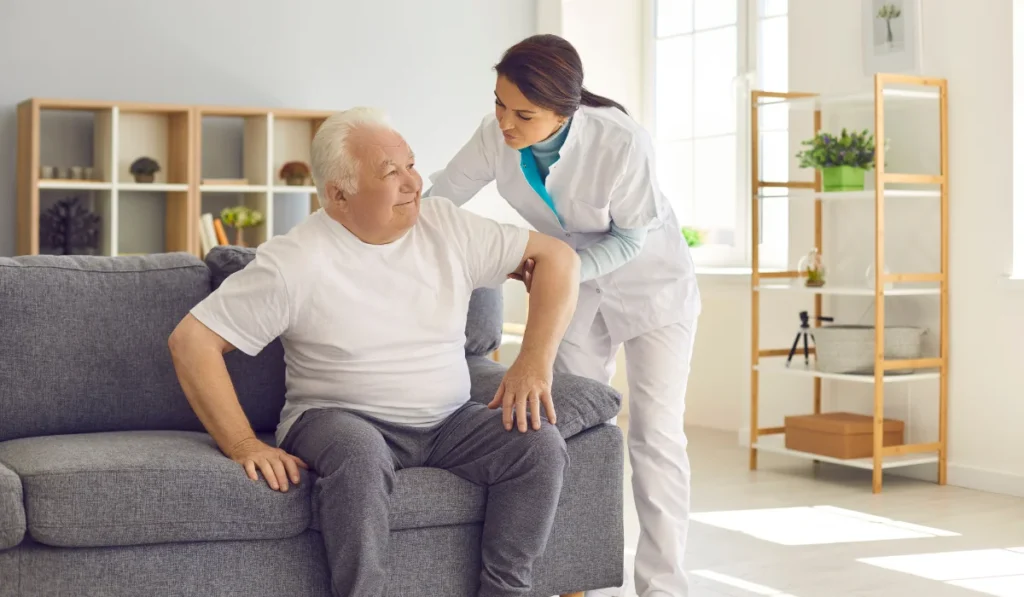
When your loved one needs help with daily activities, a Personal Care Assistant (PCA) can make a big difference. Whether the person is elderly, has disabilities, or is recovering from illness, a PCA helps them stay safe and comfortable at home.
PCAs are part of the larger home health care team. They work closely with caregivers, nurses, and family members to support people who need extra help.
In this article, we’ll explain what PCAs do and how they improve the quality of life for those they care for.
Key Takeaways
- A personal care aide helps with activities like dressing and bathing so people can stay safe at home without going to care facilities.
- PCAs check for health changes, support hygiene, clean the home, cook meals, and give emotional support.
- Each PCA follows a care plan, helps with movement, and communicates updates to nurses and family members.
- A trained PCA brings trust, skills, and kindness into the home to give both care and companionship daily.
Help With Daily Tasks
Personal Care Aides (PCAs) assist with the everyday tasks that many people find challenging as they age or recover from illness or injury. This includes things like getting dressed, brushing teeth, eating meals, and moving safely around the home.
A big part of this support involves personal hygiene and toileting. They help with bathing, brushing hair, and other grooming routines. They also assist with using the bathroom or changing adult diapers when needed.
Because these are private and sensitive tasks, they approach them with respect, clear communication, and kindness. Their help allows people to maintain dignity while staying safe and comfortable in their own homes.
According to the Centers for Disease Control and Prevention (CDC), 50% of Americans aged 65 or older will need long-term care services.
Without this type of support, many individuals would need to move into nursing homes or assisted living facilities. With a PCA, they can continue living independently with the long-term care they need, right at home.
Watch for Health Changes
PCAs are not doctors or registered nurses, but they can help watch for changes in a person’s health. They might check vital signs like temperature or breathing and look for any signs of illness.
If something seems wrong, they tell healthcare professionals. This helps the person get the medical care they need faster and can prevent bigger problems.
Support Personal Hygiene and Toileting
Many people need help with personal hygiene, like bathing or brushing their hair. PCAs help with this in a kind and respectful way. They also assist with toileting, which includes helping someone use the bathroom or change adult diapers.
These tasks are private and sensitive, so a PCA must have good communication and treat the person with dignity.
Keep the Home Clean and Safe
PCAs often do light housekeeping and help with household chores. This can include laundry, dishes, vacuuming, or changing bed sheets. A clean home helps prevent illness and makes it easier for the person to move around safely.
They may also help with organizing items or removing things that could cause a fall, especially for people who have trouble walking.
Prepare Meals and Shop for Food
PCAs assist with meal preparation. They may cook meals, help feed the person, or remind them to eat. Many also help with grocery shopping or planning meals based on special diets.
Good nutrition is a big part of basic care, especially for people with health conditions.
Offer Companionship and Emotional Support
A PCA isn’t just there to clean and cook, they’re also there to listen and spend time with the person. Many clients feel lonely, especially if they live alone. PCAs offer emotional support by talking, playing games, or simply being present.
This day-to-day connection can lift a person’s mood, reduce feelings of loneliness, and help them feel more comfortable and cared for, especially for seniors who might otherwise go long stretches without interaction.
Follow a Plan of Care
Every PCA follows a written plan of care made by a nurse or doctor. This plan lists what kind of help the person needs and how often it should happen. For example, the plan may include medication management, help with physical therapy, or certain safety checks.
PCAs must follow this plan exactly and report any changes. This helps the care team adjust the plan if needed.
Help With Movement and Safety
Many people need help moving safely around their homes. PCAs assist patients with getting in and out of bed, using walkers or wheelchairs, and avoiding falls. If a person has been to therapy, the PCA may help them do exercises at home.
Some PCAs are also trained in first aid, so they can act fast in emergencies.
Work With the Whole Patient Care Team
PCAs work with nurses, doctors, and family members to make sure the person gets the right care. They share updates about how the person is doing and report anything unusual. Communication skills are important for this job.
A PCA needs to understand instructions and explain clearly what’s going on at home.
Provide Trained and Trusted Help at Home
To do this job well, a PCA must be trained and trustworthy. Most have a high school diploma and have passed a background check. Many PCAs start without formal experience but often receive training or have worked as a nurse aide or certified nursing assistant (CNA).
Once they qualify, they are trained to show competency in tasks like personal hygiene, cooking, cleaning, and emergency care. This helps families feel confident in the care their loved one receives.
Need a Personal Care Assistant in NYC?
At Friends & Family Home Care, we offer caring, qualified PCAs across Brooklyn, Queens, Manhattan, and the Bronx. Whether you need help with toileting, meal preparation, or keeping your loved one safe at home, our team is here for you.
Call us today to learn more about our PCA and home care services.